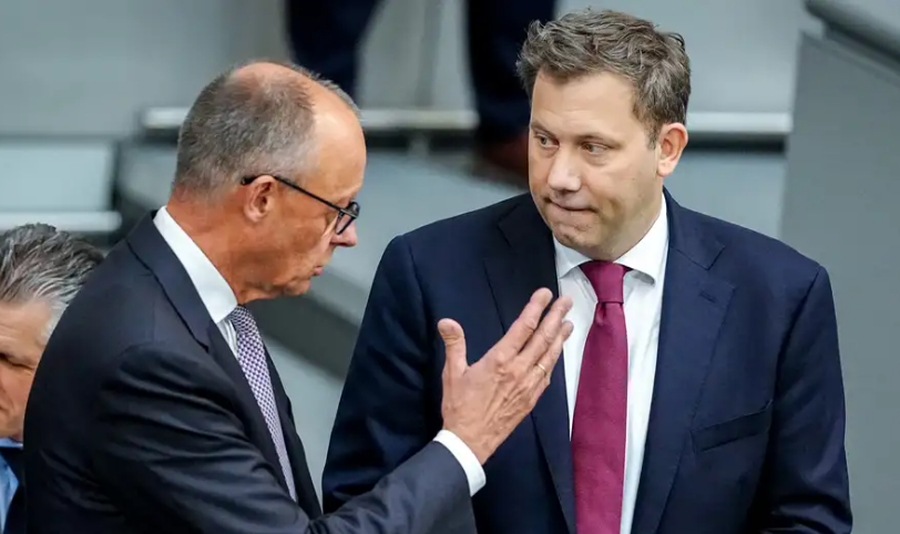
The German government plans to spend around 850 billion euros in new loans by 2029. The downside of the investment program is the increasing interest burden on the budget.
Aged roads, bridges in need of revitalization, school construction, delayed trains, lack of fast internet - these are just some of the everyday problems in Germany. But that needs to change soon. "We want the excavators to start working quickly now," said Finance Minister Lars Klingbeil as he presented his budget plans in Berlin.
On Tuesday (June 24), the government office approved the draft budget for 2025, the budget framework for 2026 and the approximate financial forecast until 2029. The government also approved a draft law that will create a special fund for infrastructure and climate, financed through borrowing.
A turn in financial policy
Infrastructure investment will play a key role in the future. This year alone, the budget has earmarked 115 billion euros for investment. "Our country is devastated and has been greatly neglected. The investment backlog is huge," said Klingbeil, who is also vice chancellor and leader of the SPD.
Infrastructure rehabilitation should also help boost an economy that is showing signs of weakness. In addition, a significant increase in defense spending is planned.
The new government's financial plan marks a turning point in German fiscal policy. In November 2024, the previous government fell due to a conflict over budget financing.
New elections were held in February 2025, and now the Christian Democrats and the Social Democrats are in power. The problem of the empty state coffers will be solved by borrowing on an unprecedented scale. Even before taking power, the coalition partners, with the consent of the Greens, approved a large financial package for the coming years - 500 billion euros for investments in neglected infrastructure. There is practically no borrowing limit for arming the Bundeswehr and increasing Germany's defense capabilities.
Hundreds of billions of investments
Klingbeil's plans, some 50 days after taking power, show what this means. This year's budget spending is planned to be 503 billion euros, of which around 143 billion will be financed through loans.
In the coming years, the debt will increase and in total should reach 847 billion euros. These are unprecedented record values, but the vice-chancellor has strongly defended such plans. Germany has a debt of 63 percent of its GDP, which is significantly lower than other countries, whose debt is sometimes higher than 100 percent.
Criticism of the "debt brake"
Nothing is more expensive than the economic stagnation of recent years, Klingbeil emphasizes. "Unlike some of my predecessors, I have no particular motivation to save money and not spend it if I see that nothing is progressing in the country," he criticizes the insistence of previous finance ministers on fiscal balance.
This balance is also enshrined in the Constitution and in fact stipulates that the state can only spend as much money as it collects. In order to exclude the investment program and the increase in defense spending from the so-called "debt brake", it was necessary to amend the Constitution.
10% of the budget for interest
NATO countries have agreed to invest five percent of their GDP in defense in the medium term, of which 3.5 percent in traditional military spending. Klingbeil wants to achieve this goal as soon as possible.
Under his plan, Germany's defense budget would gradually double by 2029 - to 152.8 billion euros. That would be 3.5 percent. Klingbeil says Germany must be "prepared in the areas of prevention and defense."
The downside of borrowing is the increase in interest costs. The Ministry of Finance estimates that the interest burden in 2029 will reach almost 62 billion euros.
This is double the forecast for 2025. According to the government's financial plan, ten percent of the budget should be allocated to interest by 2029.
Where can savings be made?
The interest costs alone are reason enough to consider savings measures in the regular budget in the coming years. Consolidation is, according to Klingbeil, a strong part of his plan. In addition, 100 billion euros in special funds for the Bundeswehr, which were allocated in 2022 after the Russian invasion of Ukraine, will be spent by 2027.
The share of defense spending in the regular budget will increase significantly, leaving little room for other spending. The Left, which is in opposition in the Bundestag, has been harshly critical of this. According to them, citizens do not need "tanks, but functional kindergartens, buses and an affordable energy transition."
Less money for social protection and climate protection?
Criticism is also coming from social associations. The Protestant church charity Diakonie believes that "investments in social infrastructure and social security" are too modest. Internal and external security also includes "the fight against poverty, support for children and young people, care for the elderly and the sick, the inclusion of people with disabilities, the integration of refugees, as well as climate protection with social justice," the evangelical humanitarian organization emphasizes.
The Greens, who are in opposition in the Bundestag, are particularly concerned that the 100 billion euros earmarked for climate measures will also be used to finance lower energy prices. The Greens believe that climate protection is being reduced to a marginal item in the budget.
The draft budget for 2025 goes to the Bundestag, where it will first be discussed in committees and in a plenary session before the summer recess, and some points may be changed. Approval is expected in September. The parliament in Germany has the supreme authority over the budget.
Meanwhile, Finance Minister Lars Klingbeil is working on a draft for 2026, which he plans to present to the cabinet on July 30. Starting in September, this budget will also be the subject of debate in the Bundestag, and will be approved by the end of November./ DW (A2 Televizion)











